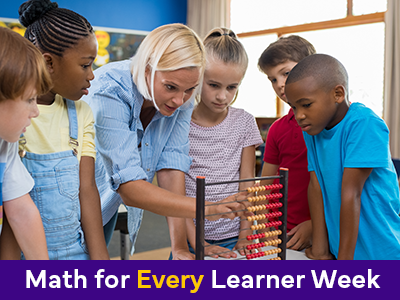
edWebinars
«Back to all edWebinars- This event has passed.
Promoting Belonging in Math Through Instructional Choices and Practices
Wednesday, January 30, 2019 @ 3:00 pm - 4:00 pm EST

Presented by Jamaal Sharif Matthews, Ph.D., Associate Professor, Montclair State University, NJ; and Alison R. Shell, Ph.D., Research Fellow, the Learner Variability Project, Digital Promise
Hosted by Barbara Pape, Communications Director, the Learner Variability Project, Digital Promise Global
Sponsored by Digital Promise
Get a CE Certificate for this edWebinar Learn more
Psychological, sociological, and educational research has shown that students’ positive perceptions of belonging in school is related to healthy school outcomes: academic motivation; achievement; mental and physical health; college GPA; and educational aspirations, among many others. Data also shows, however, that the role of belonging in school success may be even more substantial for ethnic minority and socially marginalized youth. For example, research suggests that lower value beliefs are related to lower participation in STEM during college and career for Black, Brown, and poor youth.
While many teachers may understand the significance of belonging for building classroom community and student comfort, they may be less aware of their power to promote belonging through their instructional choices and practices.
As a former middle school math teacher and now math education researcher, Dr. Jamaal Sharif Matthews grounds examples, strategies, and narratives within the domain of mathematics instruction. He discusses why and how the uncertainty of belongingness in math classes is particularly rife for many adolescents.
This edWebinar underscores mindsets and practices teachers can develop to assuage the assault against belonging and to become proactive in restoring equity and opportunity in classrooms that serve students from disenfranchised backgrounds.
During the session, Dr. Matthews and Dr. Alison Shell from Digital Promise highlight the necessity for teachers to develop healthy mindsets as precursors to enacting equity-based teaching practices. They also provide instructional strategies to help teachers analyze, coordinate, and adjust instruction in order to dismantle threats against students’ senses of belonging in the classroom and, generally, improve instruction. Last, they explain what research suggests is critical for developing a sense of belonging to achieve academic success and provide strategies teachers can use to help create belonging in math class.
This session is of particular benefit to preK-12 and higher education teachers and school and district leaders.

Jamaal Sharif Matthews is an associate professor of educational psychology at Montclair State University in New Jersey. He earned his joint Ph.D. in education and psychology from the University of Michigan, Ann Arbor. His research explores the connections between social cognition, achievement motivation, identity development and learning during adolescence. He examines these issues among historically disenfranchised populations, specifically Black American and Latinx adolescents in urban schools, applying a critical race perspective on the psychological processes that undergird adaptive and healthy school functioning for these populations.
Dr. Matthews conducts much of his research within the context of mathematics classrooms, math education and learning. The arc of his most recent work details how math instruction, executive functions, and cultural stigma interact in explaining how urban adolescents negotiate their sense of belonging in mathematics classrooms and their value of mathematics. His research has also revealed how racial identity development during adolescence can buffer the negative effects of racial stereotypes and stigma on mathematics motivation, facilitating resilient mindsets toward learning and thriving in mathematics. He has published this and related research in top academic journals, including the Journal of Educational Psychology, and Developmental Psychology, among others. Dr. Matthews has received several national awards and acknowledgements, including three competitive and prestigious dissertation awards from the American Psychological Association and ProQuest.

Prior to moving to Washington D.C., she was involved in research projects in the Boston area, including investigating the biological underpinnings of autism and working to develop more linguistically sound reading assessments for young-adult readers. Alison received her M.S. in psychology from the University of Maryland and her B.A. in cognitive science from Vassar College.

Barbara Pape is the communications director for the Learner Variability Project at Digital Promise Global (DPG). She has 20 years of experience in strategic communications, writing, and policy analysis, primarily in education. Previously, she served as Executive Producer of the award-winning Teaching & Learning conference, sponsored by the National Board for Professional Teaching Standards, where she developed content and oversaw outreach and communications. As a writer, she has written for numerous publications, including Harvard University, the National Education Goals Panel (U.S. Department of Education) and Parents magazine. Barbara also served as editor and publisher of the first electronically delivered education newsletter, the Daily Report Card. She earned an EdM at Harvard University’s Graduate School of Education and launched her career as a middle school language arts teacher.
Join the Personalized Learning for All community to network with educators, participate in online discussions, receive invitations to upcoming edWebinars, and view recordings of previous programs to earn CE certificates.

The fourth installment in Digital Promise Global’s Making Learning Personal For All series, Policies and Practices that Meet Learners Where They Are highlights the promise of personalized learning to meet the needs of the full diversity of learners. It also examines policy actions and investments that district, state, and federal and national levels can take to help each learner master content and a broad range of skills. It makes clear that personalization must consider the whole child, put learner voice and choice front and center, and be built on the learning sciences.




